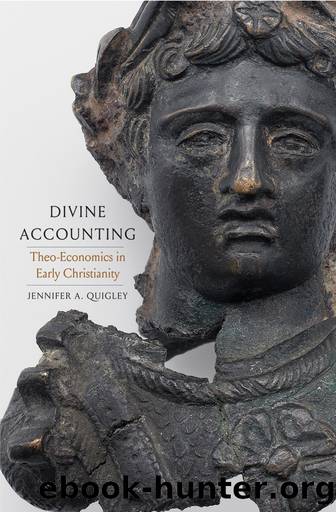Divine Accounting by Jennifer A Quigley;

Author:Jennifer A Quigley;
Language: eng
Format: epub
Publisher: Yale University Press
Published: 2021-10-15T00:00:00+00:00
CHAPTER FOUR
The Down Payment of Righteousness
And can it be that I should gain
An interest in the Saviorâs blood?
âCHARLES WESLEY, âAND CAN IT BE?â
Theo-Economic Afterlives
WHAT IS THE AFTERLIFE of some of the theo-economic language in the Letter to the Philippians? What do other early Christian writers make of the blurring of divine-human financial exchange offered in the commodification of Christ in Philippians 3 or the security and venture language found in Philippians 1? In what ways is the economy of suffering outlined in the Letter to the Philippians put to use in other early Christian texts? How do other early Christian writers describe Christ as an object that can be bought, sold, traded, or otherwise used in divine-human transactions?
In this chapter, I take up these questions by turning to a letter or set of letters written some fifty to seventy-five years after Paul, partially preserved in Greek, Latin, and Syriac: Polycarpâs Letter to the Philippians (Pol. Phil.).1 In addition to the composite nature of the text and limited manuscript tradition, some of the themes of the letter have struck scholars and interpreters as disjointed. Along with identifying the forwarding of Ignatiusâs correspondence as an occasion for the letter, Polycarp addresses numerous other topics. These include a situation surrounding a former presbyter named Valens, who, along with his wife, âhad engaged in some shady dealings, possibly involving the churchâs finances,â2 as well as polemical concerns over teachings proliferating in the communities about the full humanity of Christ, resurrection, and future judgment.3 The majority of the letter is spent in interpretation of a wide set of texts ranging from the letters of Paul (including the Pastoral Epistles), 1 Peter, Tobit, and sayings of Jesus from the gospels, coupled with teachings about ârighteousnessâ offered, Polycarp claims, at the request of the Philippians.4
By focusing on Polycarpâs use of some of the same theo-economic themes we found in Paulâs letter to Philippi decades earlier, it becomes clear that these topics are less disjointed than at first glance. There are important theo-economic ties between this letterâs focus on the use and misuse of money, exegesis of texts such as 1 Tim 6:10 (âfor the love of money is the root of all evilâ), concerns over false teaching, and emphasis on Godâs judgment. As Laura Nasrallah has recently put it, âIn the second-century Philippian community in Christ, we find that issues of moneyâthe dangerous love of money, and how benefaction can be liberativeâstill persist.â5 These issues of money, however, and the theo-economic rhetoric in which they are framed, unfurl in different directions from those found in Paulâs Letter to the Philippians, even as they echo some of its same themes.
As a starting point for considering these themes, I focus on Pol. Phil 8.1â2, where Polycarp introduces the idea that Christ is the âdown payment for our righteousness.â We find that Polycarp understands both the use of money and following proper teaching within a juridical theo-economic context in which Christ has spent blood in suffering as a down payment
Download
This site does not store any files on its server. We only index and link to content provided by other sites. Please contact the content providers to delete copyright contents if any and email us, we'll remove relevant links or contents immediately.
Never by Ken Follett(2872)
The Man Who Died Twice by Richard Osman(2289)
Machine Learning at Scale with H2O by Gregory Keys | David Whiting(2264)
Fairy Tale by Stephen King(2058)
Will by Will Smith(2032)
Reminders of Him: A Novel by Colleen Hoover(1869)
Rationality by Steven Pinker(1761)
The Stranger in the Lifeboat by Mitch Albom(1529)
The Becoming by Nora Roberts(1323)
Friends, Lovers, and the Big Terrible Thing by Matthew Perry(1321)
New Morning Mercies: A Daily Gospel Devotional by Paul David Tripp(1301)
A Short History of War by Jeremy Black(1295)
HBR's 10 Must Reads 2022 by Harvard Business Review(1251)
The Strength In Our Scars by Bianca Sparacino(1234)
The Fall of Babel by Josiah Bancroft(1231)
Can't Hurt Me: Master Your Mind and Defy the Odds - Clean Edition by David Goggins(1218)
515945210 by Unknown(1205)
Fear No Evil by James Patterson(1106)
Love on the Brain by Ali Hazelwood(1088)
